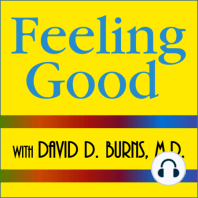50 min listen

272: Ask David, with Special Guest, Dr. Matthew May: Shoulds, Free Treatment, Blame, and More!
272: Ask David, with Special Guest, Dr. Matthew May: Shoulds, Free Treatment, Blame, and More!
ratings:
Length:
66 minutes
Released:
Dec 13, 2021
Format:
Podcast episode
Description
272 Ask David, with Special Guest, Dr. Matthew May: Shoulds, Free Treatment, Blame, and More! Here are the questions for today’s Ask David, featuring special guest, Dr. Matt May, and, of course, Dr. Rhonda Barovsky! How can I turn off my Shoulds!? Is there a downside to treating people for free? What’s the difference between Feeling Great vs Feeling Good? Isn’t it important to blame the other person when that person really IS to blame? How can I turn off my Shoulds!? Nice podcast! (Maurice is referring to Part 2 of “I want to be a mother.”) It’s refreshing to see that we sometimes mix our needs with wants. I also have a huge problem with regret and shame, saying to myself “I should be far more ahead in life.” “I should have dated more.” “I should have used my energy to create art and being productive.” I pinpointed the moment in my daily mood log, and it occurs usually when I compare myself with people online or with people in my friend group who seem to be far more ahead in life than me in terms of career and achievements or that they used their energy of their younger years more constructive than me because they didn’t deal with depression. I tried the semantic method to soften my thoughts regarding my should statements but telling myself “I wish I did xyz,” is carrying the same weight of regret as when I “should” myself. These thoughts also seem very realistic to me and pinpointing the distortions in them is not helping me much because there is so much resistance and weight to the thought, plus the positive thought that I subsequently come up with does not crush the negative thought. I often ask myself: ”Am I really a failure?” Maurice David’s Reply Thanks, Maurice You are struggling with resistance, which is the cause of virtually all therapeutic failure. You can use Search on my website to look up podcasts on Positive Reframing, Assessment of Resistance, and Paradoxical Agenda Setting. I usually select ten to fifteen or more methods to crush any Negative Thought, but would only use them after the resistance issue has been successfully addressed. For example, we could use “Let’s Define Terms,” as one of 15 or 20 potentially helpful techniques. It might go like this: Is “a failure” someone who fails all the time, or someone who fails some of the time. If you say, “some the time,” then we’re all “failures,” so we don’t need to worry about it. If you say, “all the time,” then no one is a “failure,” so we don’t need to worry about it. If that technique is not effective, we’d have tons more to try. You can read one of my books, like Feeling Good or Feeling Great, to learn more about the Assessment of Resistance and the use of various techniques to crush distorted thoughts. Might also use this on an Ask David. Can use a fake first name, too, if you like. Please advise. david Is there a downside to treating people for free? Dear David and Rhonda, I live in England, and I’m close friends with a team CBT therapist in Bristol (Andy Perrson), and I’ve been listening to your podcasts for the last year. I have found them to be stimulating, thought-provoking, often really humorous but above all enormously helpful in helping me journey with other people. I have just embarked on counselling training and would love to steer myself down the same avenues as my friend Andy. I’d also like to use your methodology at a later date. In the meantime, I have a question for you. I am conscious that almost all of your work now is done on a free, pro bono basis. I think that would be my preference as well especially as I have managed to cover the economics of life from other things and it would remove any feeling of conflict, or ambiguity around my motivations in helping people. But, I am also aware that there are so many advantages in there being a financial commitment from clients. Sadly, things that are free and that spring from generosity are not always valued by the recipient, things like commitment and timekeeping become relaxed. It can be
Released:
Dec 13, 2021
Format:
Podcast episode